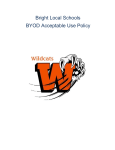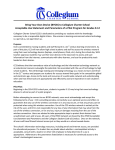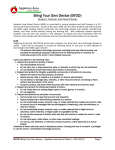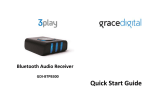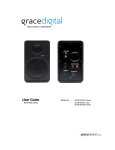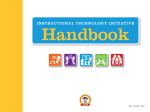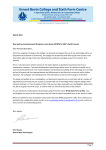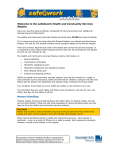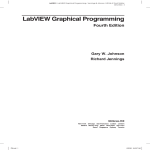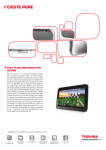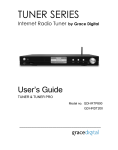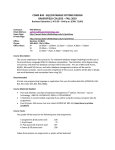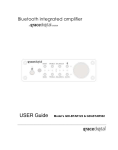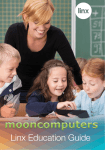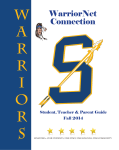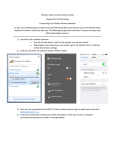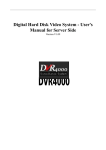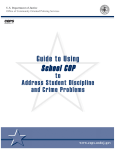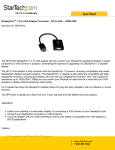Download (BYOD) & Acceptable Usage Policy (AUP)
Transcript
Plymouth School of Creative Arts Bring Your Own Device (BYOD) Acceptable Use Policy (AUP) – 1st Sep 2014 Why Bring Your Own Device? Technology is now an essential part of education. To be able to live, learn, and work safely and successfully in our information-rich society, students must be able to utilise technology effectively. Many students’ lives today are filled with technology that gives them open access to information and resources, enabling them to pursue their interests in their own way and at their own pace. The opportunities are limitless, borderless, and instantaneous. What is a Personally Owned Device? A personally owned device shall include, but not be limited to the following: iPad, Smartphones, Nook, Kindle, or other tablet PC, laptop and netbook computers. If a student is unsure if the device is acceptable they should ask school staff before registering the device. The policies outlined in this document are intended to cover all available ‘smart’ technologies, not just those specifically listed. Expectations: The school has set out the below the expectations of students using their personally owned devices. Each of these expectations shall apply to students when they are on or around the school. The entitlement to use a personal device in school is presently available to students in Year 7; this entitlement will apply to students in Year 3 from September 2015. Misuse of a device will result in the device being banned from the network. By working in line with this policy, students will: • • • • • • • • • • Only use appropriate technology at administration and/or teachers’ discretions. Use their device for educational purposes only. Only use appropriate and purposeful educational applications and/or programs on their device. Only access appropriate and purposeful educational files on their device. Be permitted to access only the school’s network through their personal devices, not private networks. Students are not allowed to use their own 3G or 4G service while at school, for the transmission of data. Be aware that the school is not liable for loss, damage, misuse, or theft of personally owned devices brought to school even if left in locked rooms (e.g. changing rooms). Observe all school internet filters. Not bring desktops or towers to school. Not connect their devices to the local area network via an Ethernet cable. Only access the network using the provided wireless network. • • • • • • Not use any device as a cyber-bullying tool or for any other offensive communication. Use headphones when listening to audio files such as music on their device so that the volume should be kept at a level that doesn’t disrupt others. If in the classroom, students may only listen to audio files when given express permission by their teachers Follow copyright laws concerning illegal copying of music, games, movies and other protected works. Not be allowed to use gaming consoles or gaming devices to connect to the network. Be prohibited from taking pictures or digital recordings of staff or students without their prior written permission. The distribution of such media will be taken very seriously. Never share username and passwords with other students or staff. Educational Purposes: Students will use their electronic device for educational purposes only. This may be in a classroom activity, such as researching a topic, using a calculator for mathematical problems, creating maps, note taking, planner/calendar, document creation, or connecting to electronic resources provided by The School. Students are responsible for their personal device and bear the burden to check with administration or staff before engaging in particular uses of technology. Inappropriate communication: As a school, we recognise that in order for our students to learn and develop to the best of their ability they need (and deserve) to feel safe. We are very clear that any form of bullying, harassment or abuse is not acceptable, and we will work with students and parents together to address this whenever it occurs. We’re also very aware of the potential for these behaviours to take place on-line. As a school, we recognise that use of IT and personal devices is very much part of 21st century living – our policy on the use of personal devices in school is really clear and aims to encourage and support the safe and responsible use of technology, with clear consequences in place for any inappropriate use. Access to the internet is of course ‘24/7’ and we recognise the potential for inappropriate online behaviour involving students who are in school together to take place outside of school and school hours. Our position as a school is that we will address any inappropriate on-line behaviour involving young people who are in our school, whenever it has an impact on students’ sense of safety and therefore their learning and development in school. Please do contact us if you have any questions or concerns relating to this, or any other aspect of the use of personal devices and social media. Details on the use of personal devices in school (‘Bring your Own Device, Appropriate Use Policy’) can be found in the Policy section of our school website. Students shall refrain from using their device for inappropriate communications. These include but are not limited to the following: bullying, threatening, obscene, profane, vulgar language and/or images that may cause damage to an individual or The School. Students cannot use their devices for personal attacks on other students or staff. Students are not allowed to harass or stalk other students or staff. If a student is instructed to stop sending electronic communications they must stop immediately. Security: The School provides content filtering for student access to the Internet. However at times, inappropriate material may get past the filters and be viewed by the student. Students are to report the occurrence to their teacher or administration. Students will be held accountable for any deliberate attempt to bypass the LGFL filters and security. All devices must be stowed away when not in use. The School strongly recommends that machines and carry cases are personalised to reduce the risk of loss. Consequences for Violations: Bringing your own device is a privilege and not a right. Students not following expectations for use of personal devices will face School disciplinary action and lose the privilege to utilize personal devices in The School for a period of time. Please review the list below for disciplinary action that will be imposed if a student violates the BYOD policy. If the pupil refuses to hand-over the device to a teacher upon request the pupil moves immediately to second offense category. • • First Offence: Confiscation and loss of BYOD privileges for an appropriate and measured period of time, along with a call to parent(s)/guardian followed by the school’s standard behaviour policy and interventions Second Offence: termination of BYOD privileges along with appropriate and measured disciplinary action in line with wider school procedure. The school reserves the right to impose higher-level sanctions at any time depending on the evident nature of the violation. User protocols Users must respect and protect the privacy of others by: 1. Using only assigned accounts. 2. Only viewing, using, or copying passwords, data, or networks to which they are authorized. 3. Refraining from distributing private information about others or themselves. Users must respect and protect the integrity, availability, and security of all electronic resources by: 1. Observing all lightspeed internet filters and posted network security practices. 2. Reporting security risks or violations to a teacher or network administrator if observed 3. Not destroying or damaging data, networks, or other resources that do not belong to them, without clear permission of the owner. 4. Conserving, protecting, and sharing these resources with other users. 5. Notifying a staff member or administrator of computer or network malfunctions through the creation of a service request. Users must respect and protect the intellectual property of others by. 1. Following copyright laws (not making illegal copies of music, games, or movies). 2. Citing sources when using others’ work (not plagiarizing). Users must respect and practice the principles of community by: 1. Communicating only in ways that are kind and respectful. 2. Reporting threatening or discomforting materials to a teacher or administrator. 3. Not intentionally accessing, transmitting, copying, or creating material that violates the school’s behaviour policy (such as messages/content that are pornographic, threatening, rude, discriminatory, or meant to harass). 4. Not intentionally accessing, transmitting, copying, or creating material that is illegal (such as obscenity, stolen materials, or illegal copies of copyrighted works). 5. Not using the resources to further other acts that are criminal or violate the school’s behaviour policy. 6. Avoiding spam, chain letters, or other mass unsolicited mailings. 7. Refraining from buying, selling, advertising, or otherwise conducting business, unless approved as a school project. Users may, if in accordance with the policy above: 1. Design and post web pages and other material from school resources. 2. Communicate electronically via tools such as email, chat, text, or videoconferencing (students require a teacher’s permission). 3. Install or download software, if also in conformity with laws and licenses, (students must be under the supervision of a teacher) for example, NearPod or Evernote/Skitch. 4. Use the resources for any educational purpose Social / Web Tools / Collaborative Content Recognising the benefits that collaboration brings to education, the school may provide students with access to websites or tools that allow communication, collaboration, sharing, and messaging among users. All school rules apply to online behaviour. Supervision and Monitoring School and network administrators and their authorized employees monitor the use of information technology resources to help ensure that uses are secure and in conformity with this policy. Administrators reserve the right to examine, use, and disclose any data found on the school’s information networks in order to further the health, safety, discipline, or security of any student or other person, or to protect property. They may also use this information in disciplinary actions, and will furnish evidence of crime to law enforcement. The school reserves the right to determine which uses constitute acceptable use and to limit access to such uses. The school also reserves the right to limit the time of access. Technical support and network connections: Students who cannot access the wireless network or may have technical issues with their technology tool need to resolve this issue by working with the user manual that came with the device outside the classroom or contact the (re)seller directly. These are not school owned devices and the school cannot allocate resources to troubleshoot connection issues or faulty devices beyond reasonable in-house support. Charging: It is the student’s responsibility to bring their device to school charged. Printing: We are not currently able to offer direct printing facilities at this time. Policy Amendments: Students that use another students phone to txt and make calls. 10/11/2014 In such a case, the device is no longer being used by the signatory of the BYOD agreement, which in turn presents a conflict of consent. This results in a week’s loss of BYOD and IT privileges as well as a phone call home. If a student wishes to make a call they may request this freely through the school office who will be able to support and respond to the individual situation and need. Students using their devices to take 'selfies' This poses a serious safeguarding issue with respect to the taking and sharing of individuals’ photographs under the school’s supervision. The purpose of photography is to capture and document learning or as learning when given explicit consent by the teacher. Consequences for misuse under these terms are ordered as follows: First instance - verbal warning; Second instance – confiscation of device; Third instance – loss of BYOD privilege and a call home. Texting during the school day Such an instance results in the loss of phone privileges for a week. In some circumstances texting can be authorised by staff if it relates to collection of students or student welfare. If you feel unsure of a situation please record all relevant details and parties involved and pass these on to the phase lead, Mike or Dave if you feel it’s a safeguarding issue.





